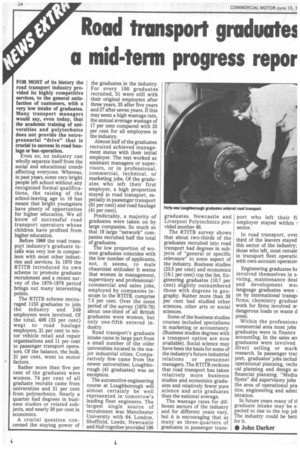Rood transport graduates a mid-term progress repor
Page 26

If you've noticed an error in this article please click here to report it so we can fix it.
FOR MOST of its history the road transport industry provided its highly competitive services, to the general satisfaction of customers, with a very low intake of graduates. Many transport managers would say, even today, that the academic training of universities and polytechnics does not provide the entrepreneurial "drive" that is crucial to success in road haulage or bus operation.
Even so, no industry can wholly separate itself from the social and educational trends affecting everyone. Whereas, in past years, some very bright people left school without any recognised formal qualifications, the raising of the school-leaving age to 16 has meant that bright youngsters have plenty of opportunites for higher education. We all know of successful road transport operators whose children have profited from higher education.
Before 1966 the road transport industry's graduate intake was very low in comparison with most other industries and services. In 1970 the RTITB introduced its own scheme to promote graduate recruitment and a recent survey of the 1970-1978 period brings out many interesting points.
The RTITB scheme encouraged 1153 graduates to join the industry and 249 employers were involved. Of the total, 406 (35 per cent) wept to road haulage employers, 21 per cent to motor vehicle retail and repair organisations and 11 per cent to passenger transport operators. Of the balance, the bulk, 21 per cent, went to motor factors.
Rather more than five per cent of the graduates were women. 74 per cent of all graduate recruits came from universities and 21 per cent from polytechnics. Nearly a quarter had degrees in business studies or related subjects, and nearly 20 per cent in economics.
A crucial question concerned the staying power of the graduates in the industry. For every 100 graduates' recruited, 51 were still with their original employers after three years, 35 after five years and 27 after seven years. If this may seem a high wastage rate, the annual average wastage of 17 per cent compared with 25 per cent for all employees in the industry.
Almost half of the graduates recruited achieved management status with their initial employer. The rest worked as assistant managers or supervisors, or in professional, commercial, technical, or marketing jobs. Of the graduates who left their first employer, a high proportion stayed in road transport, especially in passenger transport (81 per cent) and road haulage (41 per cent).
Predictably, a majority of graduates were taken on by large companies. So much so that 19 large "network" companies recruited half the total of graduates.
The low proportion of women graduates coincides with the low number of applicants, not, it seems, to male chauvinist attitudes! It seems that women in management, supervisory and professional/ commercial and sales jobs, employed by companies inscope to the RTITB, comprise 7.5 per cent. Over the same period of the survey (1970-78) about one-third of all British graduates were women, but only one-fifth entered industry.
Road transport's graduate intake came in large part from a small number of the older universities located in the major industrial cities. Comparatively few came from the newer universities; Loughborough (41 graduates) was an exception.
The automotive engineering course at Loughborough will almost certainly be well represented in tomorrow's leading fleet engineers. The largest single source of recruitment was Manchester University with 64. London, Sheffield, Leeds, Newcastle and Hull together provided 198 graduates. Newcastle and Liverpool Polytechnics provided another 46.
The RTITB survey shows that about two-thirds of the . graduates recruited into road transport had degrees in subjects of "general or specific relevance" to some aspect of the industry. Business studies (23.5 per cent) and economics (19.1 per cent) top the list. Engineering graduates (10.7 per cent) slightly outnumbered those with degrees in geography. Rather more than 36 per cent had studied other sciences, other arts or social sciences.
Some of the business studies courses included specialisms in marketing or accountancy. (Business studies degrees with a transport option are now available). Social science may have been the basis for some of the industry's future industrial relations or personnel managers. The RTITB reckons that road transport has taken relatively more business studies and economics graduates and relatively fewer pure science and arts graduates than the national average.
The wastage rates for different sectors of the industry and for different years vary, but it is encouraging that as many as three-quarters of graduates in passenger trans port who left their fi employer stayed within 1 sector.
In road transport, ovei third of the leavers stayed this sector of the industry; those who left, most remain in transport fleet operatic with own-account operator; Engineering graduates ha involved themselves in 54 vicing, maintenance desi and development woi language graduates were on by international transp( firms; chemistry graduat work for firms involved wl dangerous loads or waste d posal.
Within the professions commercial area most jobs graduates were in finance accounting. In the sales an graduates were involved direct selling or mark research. In passenger trar port, graduates' jobs includ operational planning, techr cal planning and design ai financial planning. "Mediu flyers" did supervisory jobs the area of operational pra tice, engineering and admi istration.
In future years many of ti graduate intake may be e. pected to rise to the top job The industry could be bat' for it.
• John Darker




























































































































